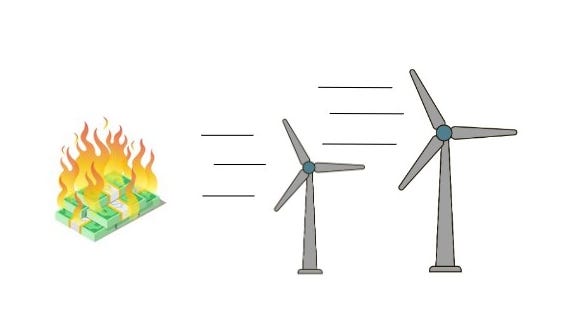Letter #236: Renewables? Better Call Them “Unreliables”
Read now to learn how there’s more to the comparison between renewables and nonrenewables than what you’ve been led to believe.
Dear Readers,
Bitcoin’s energy usage is a common talking point and, curiously enough, both critics and supporters seem equally interested in making it, rather than the financial revolution Bitcoin is driving, the primary focus of every Bitcoin-related conversation:
Critics like Greenpeace and the Biden administration in the United States constantly quip about how Bitcoin uses more energy than entire countries (as if Bitcoin is nothing more than the sum of its energy usage).
Supporters, myself included, trumpet Bitcoin’s success at stabilizing energy grids and driving investment in energy production and efficiency (perhaps giving the appearance of legitimacy to critics’ arguments in the process).
With the exception of Bitcoin’s worst detractors, who believe that Bitcoin should simply disappear, many supporters and critics alike seem to have coalesced around the idea that renewable energy can save, not only the world, but also Bitcoin’s image in the context of its energy usage.
It makes sense that a lot of people feel that way. For most of the past couple decades, we’ve been spoon fed “science” that tells us that power from wind, water, and the sun are good and that power from oil, coal, and the like will end the world. That line of thinking has become so ingrained in society that we have protesters who will throw soup on priceless paintings, halt traffic for hours on end, and, probably most perniciously, blockade the development of any new “nonrenewable” energy sources with no thought to the negative consequences to which such a course of action may lead.
But renewables have a dark side (no pun intended, Solar) that no one seems willing to talk about:
Renewables Are Woefully Unreliable
If the average climate protester had their way, the world would immediately eliminate all usage of so-called “nonrenewable” energy and immediately switch to only using “renewables”. The problem is that renewables are frequently unreliable. In other words, we can’t guarantee that they’ll be available in the moment people need them, and certainly not in an amount that exactly matches the needs of society as a whole from one moment to the next:
Wind power is perhaps the most unreliable of the bunch, and it’s likely a safe bet that the majority of us have driven past a wind farm at some point and been left wondering why none of the turbines were spinning.
The sun is always shining somewhere, but not always where solar power is needed or brightly enough to power our cities and homes. At night or when the weather is bad, solar power generation won’t keep up with demand.
Perhaps hydropower is the most reliable, since rivers don’t frequently run dry. That said, their capacity for energy generation certainly isn’t stable. For example, prior to China banning Bitcoin mining, increasing energy prices during the Sichuan province’s dry season was a statistic cited often in the Bitcoin community.
I’m sure some will want to counter those critiques by putting up battery storage as the answer. Unfortunately, battery technology is far from a place where it can reliably give power to billions of people, especially when conditions for generating renewable energy are poor for an extended period of time.
Others will probably want to point out that nonrenewables like oil and coal may eventually run out. Perhaps not though — as time goes on, further exploration and improving technologies seem to increase the available supply of nonrenewables.
Moderation In All Things
Lest anyone get the wrong idea, let me clarify that I don’t despise renewables or think they’re a bad idea; on the contrary, there is quite literally a time for all of them (i.e., when the sun is shining, the water flowing, and the wind blowing). I do find it extremely disingenuous, however, when people present renewables as a fully-fleshed out solution that can be implemented immediately for the entire world.
The truth is, I believe the best future for humanity incorporates a mix of both “renewables” and “nonrenewables”; if not forever, then certainly at least for a while.
🙋🏽♂️Did You Enjoy This Edition Of The HiFi Bitcoin Letters?
This 3-question survey is your chance to tell me how I can improve the newsletter for you.
This is not financial or business advice. This newsletter and related content are for informational purposes only. Cryptocurrencies and digital assets can be risky. Always do your own research before making any sort of investment.




